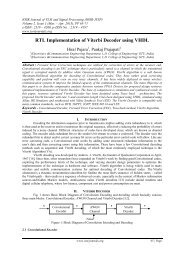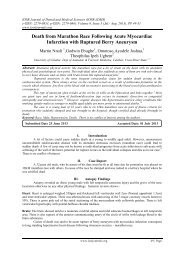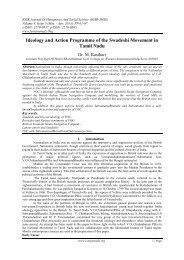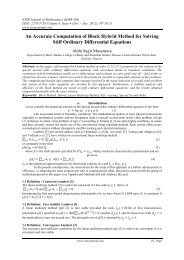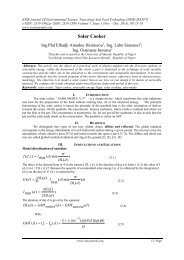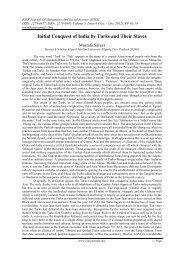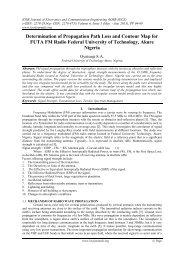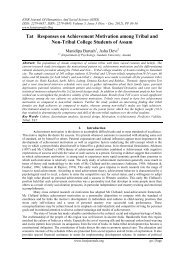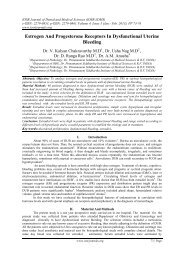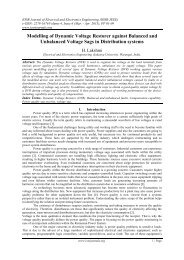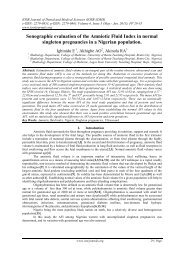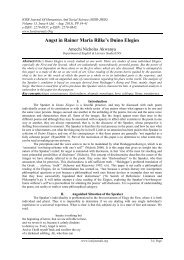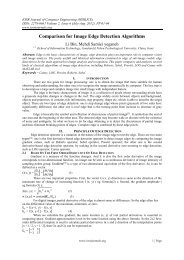Design Compatibility of Classroom Furniture in Urban and ... - IOSR
Design Compatibility of Classroom Furniture in Urban and ... - IOSR
Design Compatibility of Classroom Furniture in Urban and ... - IOSR
You also want an ePaper? Increase the reach of your titles
YUMPU automatically turns print PDFs into web optimized ePapers that Google loves.
Fuel Subsidy Removal And M<strong>in</strong>d Control Game In Nigeria: A Critical Discourse Analysis Perspective<br />
Given that absolute conformity to the doctr<strong>in</strong>e is required, a novel br<strong>and</strong> <strong>of</strong> vocabulary, popular more<br />
for its ludicrous <strong>in</strong>genuity, emerges with<strong>in</strong> the context <strong>of</strong> the group. Thereafter, group members beg<strong>in</strong> to "th<strong>in</strong>k"<br />
with<strong>in</strong> the very abstract <strong>and</strong> narrow parameters <strong>of</strong> the group's unquestionable doctr<strong>in</strong>e. The homogeniz<strong>in</strong>g<br />
term<strong>in</strong>ology effectively stymies any form <strong>of</strong> critical th<strong>in</strong>k<strong>in</strong>g by suffus<strong>in</strong>g members with a "black <strong>and</strong> white"<br />
mentality. This expla<strong>in</strong>s the seamless ease with which group members buy <strong>in</strong>to the logic <strong>of</strong> fuel subsidy<br />
removal. Failure to key <strong>in</strong>to this noble vision <strong>of</strong> the group is an open <strong>in</strong>vitation to Mr. President‘s allegation <strong>of</strong><br />
‗treasonable felony‘ as amply demonstrated <strong>in</strong> Text 4. Not many members <strong>of</strong> this group would be disposed to<br />
tak<strong>in</strong>g the high risk <strong>of</strong> fail<strong>in</strong>g to pr<strong>of</strong>ess absolute conformity to the doctr<strong>in</strong>e. For <strong>in</strong>stance, Chief Emeka Wogu,<br />
the M<strong>in</strong>ister <strong>of</strong> Labour <strong>and</strong> Productivity, dutifully re-jigged the group‘s acquired ‗black <strong>and</strong> white‘ syndrome<br />
when he remarked that the Federal Government would save about 6 billion dollars by remov<strong>in</strong>g fuel subsidy,<br />
not<strong>in</strong>g that the issue <strong>of</strong> subsidy was not ―an evil deal,‖ rather it would stimulate the country‘s economic growth.<br />
The Group General Manager, Public Affairs Division <strong>of</strong> the NNPC, Dr Levi Ajuonuma crowned the more<br />
powerful group‘s coercive persuasion with the f<strong>in</strong>ish<strong>in</strong>g cl<strong>in</strong>cher: ―As a people, we must learn to open our eyes<br />
to current realities <strong>and</strong> embrace the opportunities that a deregulated downstream sector <strong>of</strong> the oil <strong>in</strong>dustry has on<br />
<strong>of</strong>fer for us all. ―Removal <strong>of</strong> subsidy means that government would have more funds to channel <strong>in</strong>to the<br />
provision <strong>of</strong> some identified vital <strong>in</strong>frastructure <strong>and</strong> social welfare packages for some vulnerable groups like<br />
pregnant women, children, as well as unemployed youths. ―All these are captured <strong>in</strong> the post-deregulation<br />
Social Safety Net scheme.‖<br />
The forego<strong>in</strong>g constitutes the kernel <strong>of</strong> argument <strong>of</strong> advocates <strong>of</strong> subsidy removal led by the federal<br />
government <strong>and</strong> its coterie <strong>of</strong> mercantile supporters. In the next section, we present the flipside <strong>of</strong> the argument.<br />
3.2. Combat<strong>in</strong>g the m<strong>in</strong>d control strategy<br />
We had earlier noted Dijk‘s observation that ―the complexity <strong>of</strong> comprehension, <strong>and</strong> the formation <strong>and</strong><br />
change <strong>of</strong> beliefs, are such that one cannot always predict which features <strong>of</strong> a specific text or talk will have<br />
which effects on the m<strong>in</strong>ds <strong>of</strong> specific recipients.‖ In this regard, it seems pert<strong>in</strong>ent to observe that the less<br />
powerful group combats this m<strong>in</strong>d control onslaught by enlist<strong>in</strong>g discursive strategies that provide <strong>in</strong>formation<br />
from which derive alternative knowledge <strong>and</strong> beliefs needed by the Nigerian masses to challenge the discourses<br />
<strong>and</strong> <strong>in</strong>formation about fuel subsidy, which they are exposed to by the Federal Government. Texts 20 – 40 reflect<br />
the robust onslaught unleashed by anti-subsidy removal to combat the m<strong>in</strong>d control strategy <strong>of</strong> the more<br />
powerful group.<br />
It takes the form <strong>of</strong> enlist<strong>in</strong>g public support <strong>in</strong> the impend<strong>in</strong>g face-<strong>of</strong>f between federal government <strong>and</strong><br />
the Nigerian masses. The subsist<strong>in</strong>g argument is that further removal <strong>of</strong> subsidy only feeds ‗fat cats‘ at the<br />
expense <strong>of</strong> the poor <strong>and</strong> pays for gross <strong>in</strong>efficiencies down the fuel import value-cha<strong>in</strong>. This l<strong>in</strong>e <strong>of</strong> reason<strong>in</strong>g<br />
seeks credible answers to such fundamental questions: Is this the right time? Who really benefits from fuel<br />
subsidy removal? How is a halt put to the vicious cycle <strong>of</strong> fuel price-hike <strong>and</strong> <strong>in</strong>flation? Does ‗subsidy‘ like ‗a<br />
mirage‘ – disappear <strong>and</strong> relocate ahead as one draws closer? What <strong>in</strong>tervention would the government put <strong>in</strong><br />
place to reduce the <strong>in</strong>cidence <strong>of</strong> poverty result<strong>in</strong>g from imm<strong>in</strong>ent hyper <strong>in</strong>flation <strong>and</strong> how have similar schemes<br />
or projects worked <strong>in</strong> the past? Is it possible to identify projects, measure <strong>and</strong> evaluate <strong>in</strong>dividuals bus<strong>in</strong>esses<br />
that are the product <strong>of</strong> such <strong>in</strong>tervention? What has been the specific impact <strong>of</strong> such projects on overall poverty<br />
level reductions? Would it not be sensible then to delay the removal <strong>of</strong> subsidy until the government delivers on<br />
the electricity supply required to service <strong>in</strong>dustries? Does deregulation imply NNPC will no longer operate a<br />
monopoly <strong>in</strong> importation <strong>of</strong> ref<strong>in</strong>ed petroleum product or is this lobby a self- serv<strong>in</strong>g lifel<strong>in</strong>e to cont<strong>in</strong>ue its<br />
monopoly? Why should ord<strong>in</strong>ary citizens bear the brunt <strong>of</strong> government <strong>in</strong>ability to curb pr<strong>of</strong>iteer<strong>in</strong>g by a<br />
faceless bunker<strong>in</strong>g cabal the NNPC referred to? Would it not be expedient to push for greater accountability <strong>and</strong><br />
good governance to ensure a more transparent privatisation process that will respond to the market magic <strong>of</strong><br />
enterprise <strong>and</strong> ‗trickle down‘ effect? Would it not be more expedient to pressure government to service the<br />
ref<strong>in</strong>eries to full production capacity given the implications on overhead <strong>and</strong> competitiveness for local<br />
<strong>in</strong>dustries?<br />
Honest answers to these questions would em<strong>in</strong>ently predispose the Nigerian political authorities to<br />
wash their h<strong>and</strong>s <strong>of</strong>f fuel pric<strong>in</strong>g-fix<strong>in</strong>g <strong>and</strong> reth<strong>in</strong>k the policy from the po<strong>in</strong>t <strong>of</strong> susta<strong>in</strong>ability <strong>in</strong> the form <strong>of</strong> an<br />
<strong>in</strong>-built mechanism, which transfers the periodic sw<strong>in</strong>g <strong>in</strong> <strong>in</strong>put price to pump price? The Nigerian economy is<br />
almost s<strong>in</strong>gularly h<strong>in</strong>ged on crude oil export <strong>and</strong> therefore, highly sensitive to <strong>in</strong>ternal <strong>and</strong> external market<br />
shocks <strong>in</strong> the oil sector. The implication is that a fractional rise <strong>in</strong> cost <strong>of</strong> fuel has unmitigated ripple effects on<br />
the <strong>in</strong>dustrial sector <strong>and</strong> key components <strong>of</strong> basic need <strong>in</strong>dicators such as food, hous<strong>in</strong>g <strong>and</strong> health. Moreover,<br />
the ripple effects are without boundary, as social liberties for <strong>in</strong>stance, become less accessible to the average <strong>and</strong><br />
less privileged Nigerians who constitute the vast majority <strong>of</strong> the over 150 million population. The private sector<br />
suffers the biggest reverses as small scale entrepreneurs‘ lose their bus<strong>in</strong>esses due to higher bus<strong>in</strong>ess overheads.<br />
When one bus<strong>in</strong>ess is lost, many dependent families are exposed not only to poverty but other forms <strong>of</strong> social<br />
www.iosrjournals.org<br />
10 | Page



